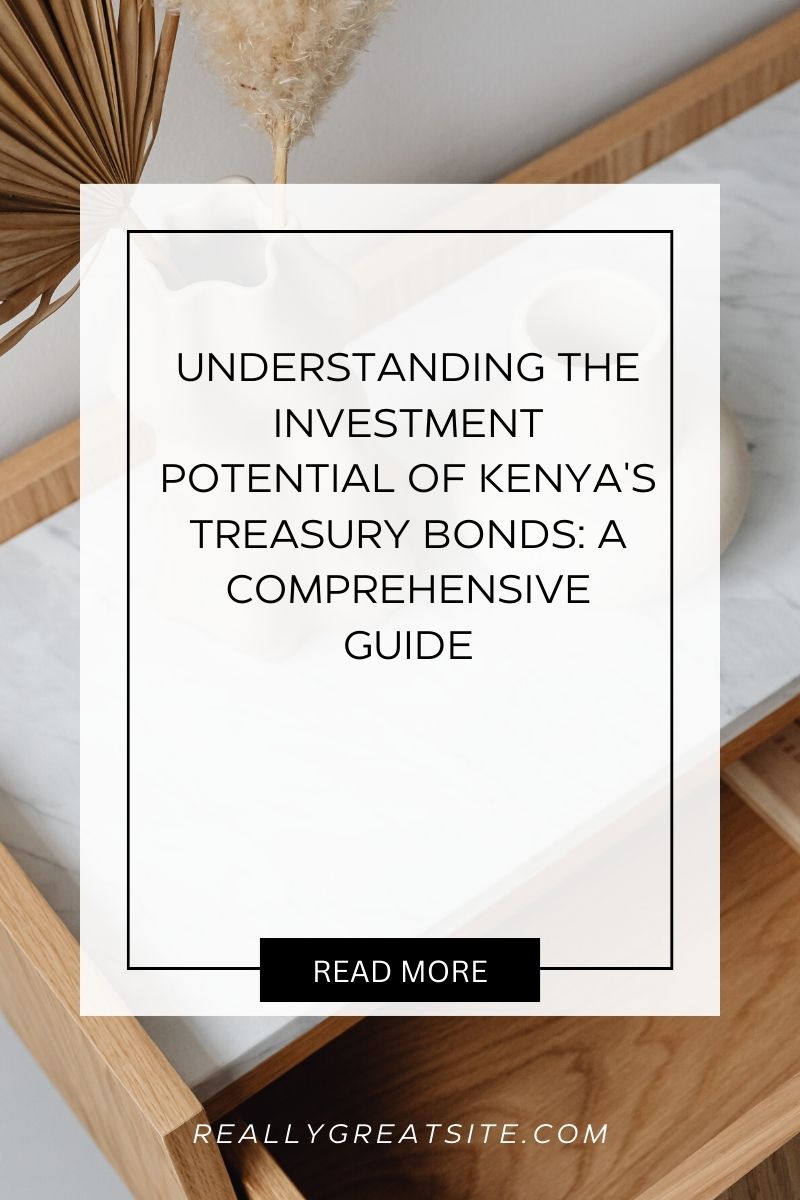Understanding the Investment Potential of Kenya’s Treasury Bonds: A Comprehensive Guide
Treasury bonds are a low-risk investment choice if you’re looking for something in Kenya. The Kenyan government issues Treasury Bonds to fund various programs and endeavours.
Investing in Treasury Bonds is essentially lending money to the government, which returns your principal amount plus interest regularly.
Contents
Understanding the Investment Potential of Kenya’s Treasury Bonds: A Comprehensive Guide. 1
Overview of Kenya’s Treasury Bonds. 3
Investment Potential of Treasury Bonds. 3
Government Fiscal Policy and Stability. 5
Domestic vs. International Bonds. 7
Treasury Bonds vs. Other Securities. 7
Future Outlook of Kenya’s Bond Market 9

How Treasury Bonds Make You Money
Alright, imagine you have some special papers called Treasury Bonds. These are like magic papers that you give to the government to help them with their important jobs, like building roads or schools.
When you give the government your magic papers, they promise to give you back more papers later, and they even add some extra papers as a thank you for helping!
So, let’s say you have a Treasury Bond. You give it to the government, and they promise to give you back the same amount of papers you gave them, plus some extra papers they call “interest.”
This extra paper is like a little reward for letting them borrow your magic paper.
Now, you don’t just give them your magic paper and wait forever.
Every now and then, maybe every few months (91,182,364 days), the government gives you some of those extra papers they promised.
They keep doing this until it’s time for them to give you back all of your original magic paper.
So, by giving your magic papers to the government and getting extra papers back over time, you’re making money with Treasury Bonds!
Another Explanation
Investing in treasury bonds is like a special way of saving your toys with the government and getting more toys in return. Pretty cool, huh?
Of course! Imagine you’re at a toy store, and there’s a big sale going on. Let’s say there’s this super cool toy that usually costs 10 toy coins, but because of the sale, you can buy it for only 8 toy coins.
That’s a discount!
Now, think of Treasury Bonds like special toys that the government sells. Sometimes, when the government needs some toy coins, they sell their Treasury Bonds to people like you.
But instead of selling them at the regular price, they might sell them at a discount, just like the toy at the sale.
So, let’s say the Treasury Bond is supposed to be worth 10 toy coins, but because of the discount, you can buy it for only 8 toy coins.
Then, when the Treasury Bond grows up and becomes a big toy, the government gives you back the full 10 toy coins!
You see, you bought it for less than it’s worth, and when you get the full amount back later, you make a little extra toy coins.
That’s the fun part about buying Treasury Bonds at a discount!
One of their advantages is that Treasury Bonds are regarded as relatively safe investments. Treasury Bonds and Bills are short-term financial products with one-year maturities offered by the Kenyan government.
Treasury Bonds offer investors a broad range of investment possibilities, with average tenures ranging from two to thirty years.
Furthermore, most Treasury Bonds available in Kenya have fixed rates, meaning that the bond’s interest rate is set at the auction and cannot change during its duration.
Making wise investing selections requires a thorough understanding of Kenya’s Treasury Bonds’ investment potential.
This article will explain how to invest in Treasury Bonds and Bills in Kenya. We will also review the advantages of owning Treasury Bonds, the dangers associated with doing so, and the things to consider.
This guide will assist you in navigating the world of Treasury Bonds and making wise financial decisions, regardless of your experience level.
Overview of Kenya’s Treasury Bonds
Kenyan Treasury Bonds may be a fantastic choice if you’re looking for a low-risk investing opportunity.
The government issues Treasury bonds as financial instruments to fund a range of programs and endeavors.
Because they have government backing and fixed interest rates—that is, an interest rate set at auction that remains constant for the duration of the bond—they are regarded as low-risk investments.
The Central Bank of Kenya (CBK) holds monthly Treasury bond auctions and provides a range of bonds all year round.
In Kenya, the majority of Treasury bonds have fixed rates, which means that the bond’s whole duration is guaranteed by the interest rate set at auction.
Semi-annual interest payments are made, and the principal amount is paid at maturity.
Treasury bonds provide a reliable stream of income, so investing in them might be an excellent method of earning a consistent income.
They are a desirable alternative for investors who wish to increase their return on investment without taking on excessive risk because their interest rates are typically higher than those of savings accounts.
It’s crucial to remember that some risk is associated with Treasury bonds. Even though the government is supporting them, it is still possible for the government to default on its obligations.
However, this risk is considered relatively low because the government has a solid record of repaying its commitments.
Treasury Bonds issued by Kenya are a fantastic choice for investors seeking a reliable source of income with little risk.
They provide a steady return on investment with stable interest rates and government support, which might assist you in reaching your financial objectives.
Investment Potential of Treasury Bonds
Treasury Bonds are desirable if you’re searching for a safe way to invest in Kenya. The Kenyan government issues these bonds, making them among the safest financial choices.
The following elements should be considered when assessing Treasury Bonds’ investment potential.

Risk and Return Profile
Because the government backs Treasury Bonds, they are typically seen as having a low-risk profile. There is always some danger associated with investments, though.
Another risk is that the inflation rate can affect your interest rates.
Treasury Bonds usually have a fixed return on investment, which means that the interest rate set at the auction is fixed for the bond’s whole duration.
Because of this, Treasury Bonds provide a steady stream of revenue over the long run.
Interest Rate Environment
The Kenyan interest rate landscape can significantly affect Treasury Bond returns on investment.
At high interest rates, the return on investing in Treasury Bonds may be more alluring than other investment options.
On the other hand, the return on investment for Treasury Bonds might not be as appealing when interest rates are low.
Inflationary Trends
When assessing the investment potential of Treasury Bonds, it is crucial to consider inflationary trends because inflation can gradually reduce the value of an investment.
Because they usually offer a set rate of return higher than the inflation rate, Treasury Bonds can be an excellent inflation hedge.
Treasury Bonds might be a safe and alluring investment choice for people searching for long-term income.
Before making an investment decision, it is crucial to thoroughly consider the risk and return profile, the interest rate environment, and inflationary trends.
Market Dynamics
Investing in Kenya’s Treasury Bonds requires a clear understanding of the market dynamics. This includes analysing both demand and supply factors as well as liquidity considerations.
Demand and Supply Factors
In Kenya, institutional investors, including banks, insurance firms, and pension funds, are the main drivers of demand for Treasury Bonds.
Because Treasury Bonds have a minimal default risk and give comparatively high returns, these investors favour them.
Treasury Bonds are also quite liquid, which makes it simple to buy and sell them on the secondary market.
The Kenyan government issues Treasury bonds, a supply-side measure, to finance its budget deficits and other development initiatives.
Thus, the total macroeconomic climate and the government’s demand for borrowing impact the issuance of Treasury Bonds.
Liquidity Considerations
Treasury bonds’ liquidity should be considered when investing in them. Since they are traded on the secondary market, Treasury Bonds are available for purchase and sale before maturity.
However, depending on the state of the market and the particular bond being traded, Treasury Bond liquidity might change.
Investors might consider purchasing actively traded Treasury Bonds to guarantee liquidity. These bonds can be bought and sold more quickly because of their large trading volume.
Investors should also consider the bond’s maturity since longer-term bonds typically have lower liquidity than shorter-term bonds.

Government Fiscal Policy and Stability
Kenya’s Treasury Bonds are regarded as a secure investment choice because of the government’s dedication to economic stability and fiscal sustainability.
The government has implemented several fiscal measures to guarantee the stability and expansion of the nation’s economy.
The Green Fiscal Incentives Program Framework is one such program that attempts to increase government revenue streams by encouraging eco-friendly behaviours across various industries.
The policy’s green fiscal policy initiatives could make Kenya’s economy more environmentally friendly.
The Kenyan government’s effective control of debt levels demonstrates its dedication to economic sustainability.
Per the Joint World Bank-IMF Debt Sustainability Analysis, Kenya’s debt levels by the close of 2020 amounted to 32.4 per cent of GDP.
To control its debt levels, the government has been able to issue domestic debt in the form of Treasury bills and bonds. These government securities are issued and managed by the Central Bank of Kenya.
In October 2021, the average interest rates on Treasury bills maturing in 91 days, 182 days, and 364 days were 7.0 per cent, 7.4 per cent, and 8.2 per cent, respectively.
The financial stability reports issued by the Kenyan government demonstrate its dedication to maintaining economic stability.
The Central Bank of Kenya and other financial sector regulators produced the Kenya Financial Stability Report 2019, which evaluates the nation’s financial stability from January 2019 to June 2020.
The report highlights the government’s efforts to uphold macroeconomic stability, encourage stability in the financial sector, and strengthen the financial system’s resilience.
Comparative Analysis

It’s critical to comprehend how Kenyan Treasury bonds compare to alternative domestic and foreign investment possibilities before making any decisions.
This section will examine two primary comparison topics: treasury bonds vs. other securities and domestic versus foreign bonds.
Domestic vs. International Bonds
It is an important decision to make domestic or foreign investments while purchasing Treasury bonds.
International bonds are issued and traded abroad, while domestic bonds are issued and traded within Kenya.
Since domestic bonds are not as vulnerable to outside variables like political unrest and fluctuations in exchange rates, they are typically regarded as less hazardous than foreign bonds.
However, foreign bonds could yield higher yields because of interest and currency exchange rate variations.
Treasury Bonds vs. Other Securities
It’s crucial to evaluate Treasury bonds against other assets, such as equities and corporate bonds, before making an investment.
Treasury bonds are often regarded as less hazardous than equities since the government backs them and gives a fixed return. Long-term returns on stocks, however, might be more significant.
Treasury bonds are often considered safer than corporate bonds because the government backs them.
However, because corporate bonds have different interest rates and credit ratings, they might yield better returns.
In general, it is crucial to thoroughly analyse the risks and returns of various investment options when purchasing Treasury bonds and decide which best suits your investment goals and risk tolerance.
Investor Considerations
Many considerations need to be made when thinking about purchasing Kenyan Treasury Bonds. Before making any financial decisions, you should consider the following essential factors.
Investment Horizon
Ascertaining your investment horizon is crucial before making a Treasury Bond investment. The maturities of Treasury Bonds range from two to thirty years.
If you have a short investment horizon, you might consider investing in Treasury Bills with maturities of up to one year.
Conversely, if your investment horizon is longer, you might want to consider buying long-term Treasury Bonds.
Tax Implications
The tax ramifications of purchasing Treasury Bonds are a crucial factor to consider. Withholding tax on interest from Treasury Bonds is charged at a 15% rate.
On the other hand, if you are a Kenyan tax resident, you may be eligible for a tax credit for the withholding tax you paid on your interest income.
Diversification Benefits
Your portfolio might benefit from diversification when you invest in Treasury Bonds.
Because the Kenyan government backs Treasury Bonds, they are regarded as low-risk investments, which is why risk-averse investors find them incredibly enticing.
Furthermore, Treasury Bonds offer a consistent revenue stream through fixed-interest payments typically made semi-annually.
When considering investing in Kenya’s Treasury Bonds, you can make well-informed choices by evaluating your investment horizon, potential tax savings, and the advantages of diversification.
Regulatory Framework
It’s crucial to comprehend the legal structure governing Kenyan Treasury Bonds before investing.
The regulatory framework, which offers the rules and procedures required to guarantee accountability, openness, and equity, is an essential investment component.
In Kenya, the Central Bank of Kenya (CBK) is in charge of the Treasury Bond regulatory framework. The CBK is also in charge of issuing and overseeing Treasury Bonds for the government.
The secondary market for Treasury Bonds, where investors can purchase and sell previously issued bonds, is likewise governed by the CBK.
One of its main characteristics is the obligation placed on issuers by the Treasury Bond regulatory framework to furnish investors with comprehensive details regarding the bond offering.
This data includes the bond’s terms and conditions, interest rate, maturity date, and issuer credit rating.
This knowledge is crucial for investors since it enables them to make well-informed investment decisions.
Additionally, the regulatory system ensures that Treasury Bonds are distributed fairly and transparently.
The CBK sets the interest rate for every bond issue through a competitive bidding process.
This procedure benefits both the issuer and the investor and guarantees that the interest rate is set at a reasonable market value.
Lastly, investor protection is covered by the Treasury Bond regulatory framework. Issuers must keep up a sinking fund or reserve account, as the CBK requires.
This account is used to repay the bond’s principal when it matures. If the issuer cannot repay the bond at maturity, this offers investors an extra degree of security.
Kenya’s Treasury Bond legislation is well-established and provides investors with the rules and standards they need to make wise investment choices.
If you know the regulatory environment, you can confidently invest in Kenyan Treasury Bonds.
Future Outlook of Kenya’s Bond Market

Kenya’s bond market is expected to expand and flourish in the future.
The country’s debt market is anticipated to undergo a revolution by introducing the East African Bond Exchange (EABX), which promises improved liquidity, transparency, and growth potential [1].
Terrence Adembesa, the CEO of EABX, sees exponential growth in Kenya’s bond market, which is now smaller and less active than other countries.
Furthermore, investor confidence in the nation’s bond market is anticipated to increase due to the government’s commitment to fiscal restraint and debt sustainability.
In recent years, the government has made several changes to enhance the bond market’s openness and efficiency, including automated trading platforms and installing primary dealer systems [1].
Kenya’s advantageous location, robust economic fundamentals, and alluring investment prospects further help the country’s bond market.
With a population of over 300 million and a burgeoning middle class with rising purchasing power, the nation serves as a gateway to East Africa.
Furthermore, Kenya’s economy is diverse and has a robust private sector, especially in the technology and service sectors, which present both domestic and foreign investors with appealing investment prospects.
The bond market in Kenya offers astute investors a chance to expand their investment holdings and become involved in a developing and dynamic economy.
Kenya’s bond market is expected to grow and flourish in the following years due to the government’s commitment to fiscal reduction, the impending launch of the EABX, the nation’s advantageous location, and its sound economic foundation.


Leave a comment